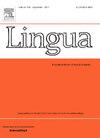研究文章摘要词汇密度的异时变化:基于语料库的研究
IF 1.3
3区 文学
0 LANGUAGE & LINGUISTICS
引用次数: 0
摘要
词性密度是指内容词的比例,衡量学术文本的信息密度。在学术写作研究中,它一直被视为衡量写作水平和作者风格的重要指标。最近一项基于《自然-生物学通讯》的研究报告称,在该杂志上发表的研究文章的词性密度呈上升趋势。然而,这一发现还需要更大的数据集来验证。此外,这种趋势在不同学科之间是否存在差异仍是未知数。本研究使用来自 16 个学科的大规模研究文章摘要语料库,揭示了词汇密度上升可能是所有领域的共同趋势。此外,跨学科比较的结果表明,硬学科比软学科表现出更高的词汇密度。据我们所知,这可能是第一项利用广泛的多学科文本数据研究词汇密度的时间动态和学科差异的研究。本文讨论了研究结果的可能原因和实际意义。本文章由计算机程序翻译,如有差异,请以英文原文为准。
Diachronic changes in lexical density of research article abstracts: A corpus-based study
Lexical density refers to the ratio of content words and measures the information density of academic texts. It has been regarded as an important indicator of writing proficiency and author style in academic writing research. A recent study based on Nature Biology Letters reported an upward trend in lexical density in research articles published in the journal. However, such a finding needs to be validated with a larger dataset. In addition, it remains unknown whether such a trend varies among disciplines. Using a large-scale corpus of research article abstracts from 16 academic disciplines, the present study reveals that the rise in lexical density could be a common trend across all fields. Moreover, the results of cross-disciplinary comparisons show that hard disciplines exhibit higher lexical density than soft disciplines. To our knowledge, this is probably the first study to investigate both the temporal dynamics of and disciplinary variations in lexical density using extensive multidisciplinary text data. Possible reasons for and practical implications of the findings are discussed.
求助全文
通过发布文献求助,成功后即可免费获取论文全文。
去求助
来源期刊

Lingua
Multiple-
CiteScore
2.50
自引率
9.10%
发文量
93
审稿时长
24 weeks
期刊介绍:
Lingua publishes papers of any length, if justified, as well as review articles surveying developments in the various fields of linguistics, and occasional discussions. A considerable number of pages in each issue are devoted to critical book reviews. Lingua also publishes Lingua Franca articles consisting of provocative exchanges expressing strong opinions on central topics in linguistics; The Decade In articles which are educational articles offering the nonspecialist linguist an overview of a given area of study; and Taking up the Gauntlet special issues composed of a set number of papers examining one set of data and exploring whose theory offers the most insight with a minimal set of assumptions and a maximum of arguments.
 求助内容:
求助内容: 应助结果提醒方式:
应助结果提醒方式:


